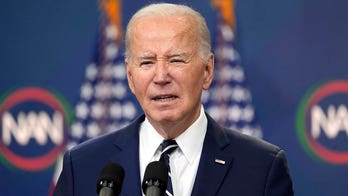Gov. LePage: We're Fixing Problems in Maine
Maine governor on reducing state income tax rate, spending
Maine's outspoken Republican Gov. Paul LePage battled in court Wednesday over allegations he bullied a nonprofit into rescinding a job offer to his top political rival, state House Speaker Mark Eves, as political payback.
Eves, a Democrat, contends that LePage acted out of “personal rage, vindictiveness, and partisan malice” by pressuring Good Will-Hinckley charter school to pull their employment offer to Eves.
The lawsuit claims the school was backed into a corner after the governor threatened to withhold $530,000 in state funds if it went through with plans to hire Eves as its new president.
At first Good Will-Hinckley stood by Eves but later announced it would look for a new president.
Eves sued.
“The Governor knew that the unexpected loss of that state funding would also cause the school to lose another $2,000,000 in private funding and that these sudden financial losses would put the school out of business,” the lawsuit states. The suit accuses the governor of abusing taxpayer money, and even “blackmail.”
Wednesday’s hearing focused on the governor’s motion to dismiss the lawsuit.
Lawyers from both sides presented oral arguments to U.S. District Judge George Singal, who said he would issue an order in the “very near future.”
LePage’s attorney Patrick Strawbridge argued the governor made a legally protected political statement and therefore should be granted immunity.
Eves’ lawyer David Webbert made the case against immunity – saying his client was targeted because he is a Democrat.
“Folks that have at-will employment still can’t be fired because of their race or their political affiliation,” Webbert said.
Eves’ lawsuit against LePage marks the first time in four decades that a sitting Maine governor has been sued by an individual.
LePage, though, isn’t backing down.
According to court records, LePage was asked about the allegations that he had a hand in pressuring the school to dismiss Eves.
“Yeah, I did! If I could, I would! Absolutely. Why wouldn’t I? Tell me why I wouldn’t take the taxpayer money, to prevent somebody to go into a school and destroy it,” the lawsuit quotes LePage as saying.
Court records also contain statements the governor made during a radio interview on July 30.
“I’ll tell you what my mindset was,” LePage explained. “This guy is a plant by the unions to destroy charter schools. … I believe that’s what his motive is. … That man had no heart.”
The governor contends Eves would be a bad fit for the school because he had spoken out against charter schools in public. But then LePage’s justification took a turn.
“It is just like one time I stepped in when a domestic violence, when a man was beating his wife. Should I have stepped in? Legally, no. But I did. And I’m not embarrassed about doing it,” he said.
Last year, state lawmakers tried to impeach LePage over the case. Eight separate allegations were brought against the governor with the reccurring theme of him strong-arming government and non-profit organizations.
“People have really had enough, all across the state,” state Rep. Ben Chipman told The Atlantic. “They’re tired of the governor’s behavior and they’re tired of the legislature not doing anything about it.”
Supporters of the Democratic-led impeachment effort were ultimately unable to overcome a Republican move to indefinitely postpone the discussion.
LePage issued a written statement slamming Democrats and described the impeachment attempt as “a political witch hunt that had absolutely no merit.”
Maine Attorney General Jane Mills, a Democrat, already has declined to pursue criminal charges against LePage, saying there was no evidence he abused his power.
This isn't the first time a governor has been accused of using state money as leverage in a dispute with another official.
In February, former Texas Gov. Rick Perry was cleared of all criminal charges against him related to allegations he misused his power while in office. The charge against him was filed after Perry threatened – and then carried out – a veto of state funding for a group of public corruption prosecutors after the Democratic head of the unit refused to resign.
Calls to LePage’s office for comment were not returned.





